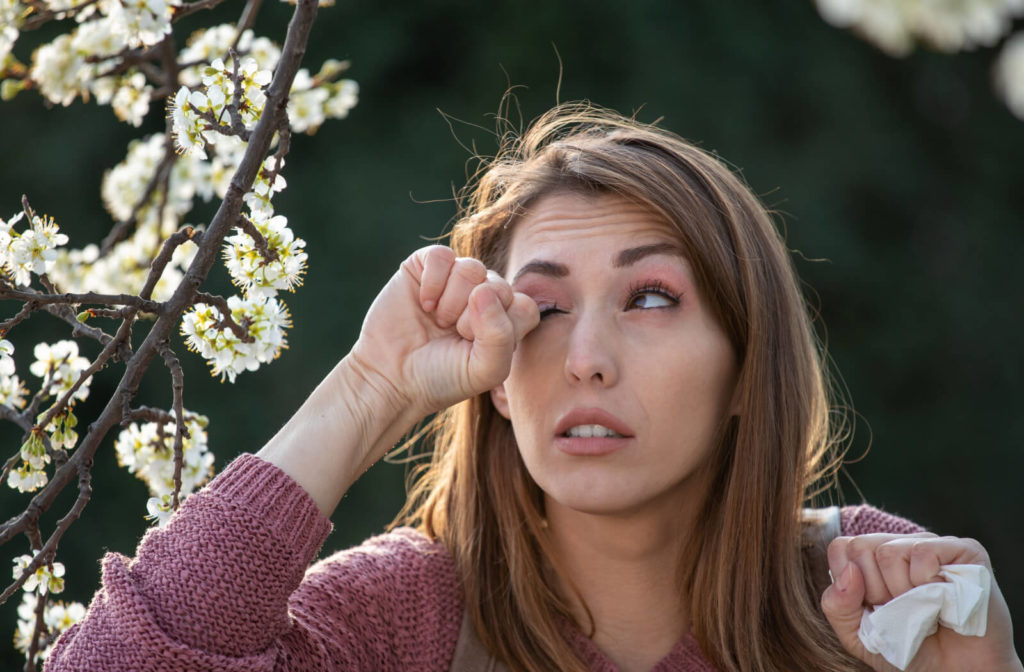Over 16 million people in America experience symptoms from dry eyes. There are many reasons that you could be experiencing dry eye disease, and allergies could be one of them. Certain allergies can cause dry eye symptoms, but allergies are not the only underlying cause of dry eyes.
Along with your allergies, there could be other factors causing your symptoms. To better understand what is actually causing your dry eyes, your optometrist can provide a comprehensive eye exam to identify and treat both your symptoms and the underlying causes.
If you have allergies that are causing dry eyes, treating the allergy first can change your dry eye symptoms. Dry eyes caused by allergies can have symptoms that are mistaken for other issues, so having a clear understanding of how your allergies affect you can help you find relief.
Having a better understanding of the difference between dry eyes and allergies can also help you get treatment that provides relief for your symptoms.
What Are Some of the Symptoms of Dry Eyes?
Your eyes produce moisture (or tears) continually to stay lubricated. If your eyes are not producing enough tears or the tears that are being produced are of inadequate quality, this can lead to discomfort and irritation caused by dry eyes.
When you have dry eyes, there are many symptoms that you could be experiencing, and you may experience one or more symptoms simultaneously.
Some of the more common symptoms are:
- Eye redness
- Foreign body sensations
- Irritation when blinking
- Sandy, scratchy, or gritty sensations
- Stinging or burning sensations
- Watery eyes
- Changes in your vision
- Stringy mucus in or around your eyes
- Sensitivity to light and difficulty seeing in low light or at night
Dry eyes are a chronic condition that must be treated and managed. Some of the other potential reasons that may have dry eyes include:
- Medications: Some medications and prescriptions cause dry eyes as a side effect. If a new medication is causing dry eye symptoms, speaking with your optometrist and the prescribing doctor can help you find solutions for relief.
- Aging: Some people over the age of 50 will start to see a decrease in tear production.
- Other medical conditions and diseases: Other eye conditions like blepharitis and existing health conditions like diabetes or rheumatoid arthritis can also cause dry eyes.
- Environmental factors: Allergens, dry air, wind, and other environmental factors can cause dry eyes.
Eye Allergies and Dry Eyes
When you are experiencing an eye allergy, it is known as allergic conjunctivitis. It can be hard to tell the difference between dry eyes and eye allergies. For example, some of the common symptoms of both dry eyes and eye allergies are eye irritation and redness.
When our eyes get irritated, a common response is to rub them. This can cause the eye to get puffy and red, causing many people to think the issue is linked to another condition. When you rub your eyes, it can also cause your eyes to water more than normal. Since this is a symptom of dry eye, it can be easily mistaken.
If you’re experiencing strong discomfort from symptoms of either condition, speaking with an optometrist can help you determine the cause of your symptoms and find a treatment that provides relief.

How Are Dry Eyes and Allergies Connected?
When you have dry eyes from allergies, your symptoms may have certain triggers, and some triggers for dry eyes can cause similar symptoms. When you are trying to understand if you have dry eyes due to allergies, take note of when you are experiencing this condition. This will help you isolate some of the main causes.
Some environmental factors and irritants can cause you to have dry eyes. Potential triggers can include some of the following:
- Perfume
- Tree pollen, weeds, or grass
- Cigarette smoke
- Mold
- Dust mites
- Pet dander
Depending on what you are allergic to, there may be changes you are able to make to your lifestyle to alleviate your symptoms. If you are able to change or even eliminate some of the external factors, you may find that your condition changes.
While for many people, dry eyes are a chronic condition, for others, it can simply be connected to their environment. If your dry eyes are caused by allergies, by only treating the dry eye, your condition may not improve. By making adjustments to manage allergies, you may get more relief from dry eyes as well.
Options For Your Eye Health
When it comes to your eye health, the optometrists at Pacific EyeCare Optometry are here to guide you. Our optometrists want to help you find the right treatment for the symptoms that you are experiencing.
Contact our eye care professionals today so that they can help you on your way to dry eye relief.



